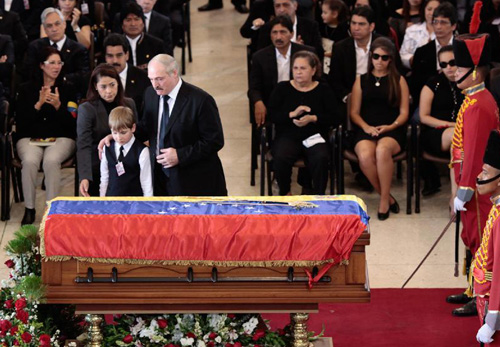
The March 2013 Record of Belarus’s Foreign and Not-So-Foreign Relations
Publication: Eurasia Daily Monitor Volume: 10 Issue: 49
By:

Since the beginning of March, three hallmark events occurred in Belarus’s relations with the countries located to the west of it. First, President Alyaksandr Lukashenka visited Caracas, Venezuela, where he participated in the funeral of Hugo Chavez (tvr.by, March 9). If any friendships actually exist among heads of states, the relationship between Chavez and Lukashenka closely resembled one.
However paradoxical it may seem, Lukashenka shares more similarities with such national leaders as Hugo Chavez of Venezuela, Evo Morales of Bolivia, and Rafael Correa of Ecuador than with the leaders in Lukashenka’s own corner of the world. The points of similarity are a modest background (though not a trait of Correa, it fits all the rest in the group), a special bond with the working-class people, a lack of acceptance of the end-of-history thesis, hostility to rampant privatization seen as perfidious advice dispensed by the so-called Chicago boys (a moniker for the disciples of Milton Friedman), and reflexive anti-Americanism touted as a response to what is perceived as heavy-handed interference in domestic affairs under the guise of democracy promotion (https://blog.belta.by/?p=902). One other point of similarity appears to be a desire to lead the forces challenging global and regional superpowers. In this regard, Alexei Volgin’s analysis of Belarusian nationalism’s “imperial phantoms” deserves attention (ostkraft.ru/ru/articles/331). Whereas in the West the label of nationalism—when it comes to Belarus—is almost invariably affixed only to its Westernizing varieties embraced by the Belarusian opposition, Volgin focuses on the national ideas that contrive to embrace both cultural closeness to Russia and opposition to its hegemony. Such ideas are developed under the auspices of the Minsk-based Citadel project (https://cytadel.org/), a think tank with shadowy funding. Two of the project’s most active authors, Alexander Shpakovsky and Alexander Sinkevich, for example, write about Belarus’s geopolitical expansion and Belarus’s potential leadership over the “peoples of the northern tradition.” Both authors are active in other online publications (e.g., Naviny.by) and, much like the president of Belarus, oppose both Western democracy promotion and Russian hegemony.
The second hallmark event in the area of international relations was a visit to Minsk by the delegation of the Organization for Security and Cooperation in Europe’s (OSCE) Office of Democratic Institutions and Human Rights (ODIHR) and its meetings with parliamentarians and members of the opposition (www.ng.ru/cis/2013-03-07/6_minsk.html). On many occasions, ODIHR criticized not only the conduct of parliamentary elections in Belarus but also its electoral legislation. Projected changes in this legislation are to be publicized in April. That Minsk decided to accept the ODIHR delegation during the final stage of work on those changes may be considered a positive sign.
The third hallmark event was the previously unannounced two-day visit to Minsk by President Tomislav Nikolic of Serbia. Nikolic thanked Belarus for its support of Serbia’s struggle to retain its territorial integrity. “We understand,” said Nikolic at a press conference in Minsk, “all your difficulties and misfortunes. For many years, Serbia was under EU [European Union] sanctions, and that is where the roots of our crisis are. But even then we did not give up and they had to bomb us. I hope that democracy will not be introduced this way ever again.” (https://www.belta.by/ru/all_news/president/Belarus-i-Serbija-gotovy-razvivat-otnoshenija-na-vsex-urovnjax-i-vo-vsex-sferax_i_627023.html). Nikolic thanked Lukashenka for his courage in visiting Serbia during the 1999 North Atlantic Treaty Organization (NATO) bombing campaign, and he assured his counterpart that although Serbia wants membership in the EU, it does not want it at any cost.
Because about 80 percent of Belarusians do not consider Russia to be a foreign country (according to the September 2009 representative national survey by a polling agency funded by the West; see https://naviny.by/rubrics/politic/2010/10/07/ic_articles_112_170745), Belarus’s relationship with Russia deserves to be analyzed under a rubric separate from foreign relations at large. In this area, two observations are noteworthy.
First, Russia and Belarus are intensifying their preparation for joint military exercises “West-2013,” which will take place in Belarus this September (RIA Novosti, March 11). Vladimir Putin’s belligerent speech on February 27, 2013, is being perceived as general guidance for Russia’s attempts to challenge the United States’ Ballistic Missile Defense (BMD) system, whose elements will potentially be located in various European countries. Thus, the 9K720 Iskander, a mobile theater ballistic missile system, produced in Russia, may be deployed in Belarus as well as the S-400 zenith rocket system and modernized S-300B surface-to-air missile launchers (https://naviny.by/rubrics/society/2013/03/11/ic_articles_116_181085/).
But second, according to Stas Ivashkevich, an investigative journalist specializing on Belarus-Russia integration, President Lukashenka has once again contrived to play two of the most important of Russia’s “protégés” in Belarus off against each other. One of them is Igor Zhilin, in charge of the petrochemical conglomerate Belneftekhim. According to Ivashkevich, Zhilin, previously linked to Gazprom, appeared in Belarus in 2009 in order to ensure the sales of several lucrative Belarusian assets—notably the Grodno-based Azot (Nitrogen) plant—to Russian tycoons. In January 2011, Belarus did not receive export-duty-free Russian oil for the entire month. Duty-free deliveries resumed only after Zhilin became the boss of Belneftekhim. However, by the end of 2012, Zhilin ran afoul of the Belarusian government because of the electricity prices Belneftekhim was forced to pay it. At one point, Zhilin threatened that he would start buying electricity directly from Russian suppliers. In the Belarusian government, it was Vladimir Semashka, a deputy prime minister, who challenged Zhilin. A conflict between Semashka and Zhilin became acrimonious and was publicized by Lukashenka who, on March 2, reprimanded both. The accusation against Zhilin seems to be tougher than against Semashka, as a certain corruption scheme under Zhilin has been uncovered, whereas Semashka was just chastised for being rude. According to Ivashkevich, Lukashenka’s goal all along was to pull Belarus’s Prime Minister Mikhail Myasnikovich and Russia’s alleged “Protégé Number One” (Zhilin) into the conflict. Ivashkevich recalls that Myasnikovich became the prime minister when Russia’s pressure on Belarus was at its peak and then miraculously subsided. Now, as corrupt practices at Belneftekhim are under investigation, Lukashenka is effectively forcing one alleged protégé of Moscow (Myasnikovich) to fire the other (https://naviny.by/rubrics/economic/2013/03/12/ic_articles_113_181102/). If Ivashkevich’s analysis is on target, Lukashenka is in his element, and intriguing developments can assuredly be expected in the foreseeable future.




